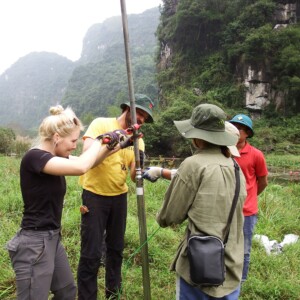
Rachael Holmes
University of Leicester
Project
Tracing the Legacy of Human-induced Transformation of the Biosphere in Island Southeast Asia
Supervisors
- Prof.. Mark Williams (University of Leicester)
- Dr. Juan Carlos Berrio (University of Leicester)
- Prof. Iskandar Zulkarnaen Siregar (Bogor Agricultural University)
- Prof. Ulrich Salzmann (Northumbria University)
- Prof. Jan Zalasiewicz (University of Leicester)
- Prof. Sarah Gabbott (University of Leicester)
- Prof. Sue Page (University of Leicester)
PhD Summary
The “Anthropocene,” is currently an informal term that refers to the current period in the history of the planet in which direct and indirect human influence has transformed the Earth. The current rate and scale of change appears to be unprecedented in the geological record. Understanding how ecosystems have changed because of both environmental and human impacts is essential for predicting how they will adapt in the future. Palaeoecology (or the study of past environments) draws on several disciplines including ecology, geology and archaeology, to extend our knowledge of landscape dynamics into the deep past – beyond the timeframe of modern and historic records. My PhD research draws on these disciplines to produce data that can be used to both understand when the Anthropocene began as well as address some of the key socio-ecological challenges of the period. I focus on the region of Island Southeast Asia and tackling two key challenges 1) the spread and impact of non-native naturalized plant species and 2) improving the success of mangrove ecosystems restoration projects.
I work with digital archives and botanical datasets as well as a range of palaeoecological proxies (i.e. pollen, spheroidal carbonaceous particles, phytoliths, microcharcoal etc.) and place these data in historical and archaeological context.
What inspires you
Like many people globally much of my experiences of the natural world when I was younger was from watching TV. When I was around nine, I wrote a letter to David Attenborough explaining that I wanted to have his job…luckily, he wrote back and encouraged me to go to university and do a degree in zoology. I ended up following his advice and became the first person in my family to get an undergraduate degree (although I realised, I liked primates and people the most so picked anthropology initially!).
Previous activity
Before my PhD, I studied Anthropology (BSc) at Bournemouth University. Alongside my bachelors I was employed in a museum, doing science outreach and as a research assistant, processing sediments for phytoliths from archaeological sites, as well as working on a number of research projects both in the lab and field. I also worked a range of non-academic jobs in supermarkets, pubs and as a postie!
Why did you choose doctoral research?
Throughout my degree I worked on archaeological excavations in the United Kingdom, Finland, Romania and Vietnam. Working as part of international and multidisciplinary teams I became increasingly interested in pursuing a research career. When I saw this project advertised, I wanted to take the opportunity to continue learning and working in an area of research that I am passionate about.
Why did you choose CENTA?
chose to do a CENTA studentship because of the emphasis on producing truly inter-disciplinary researchers. I wanted to take advantage of the training that they provide that is traditionally outside of my field to broaden my perspective when it comes to research.
Future plans
I want to pursue a career in research, science communication and policy.
